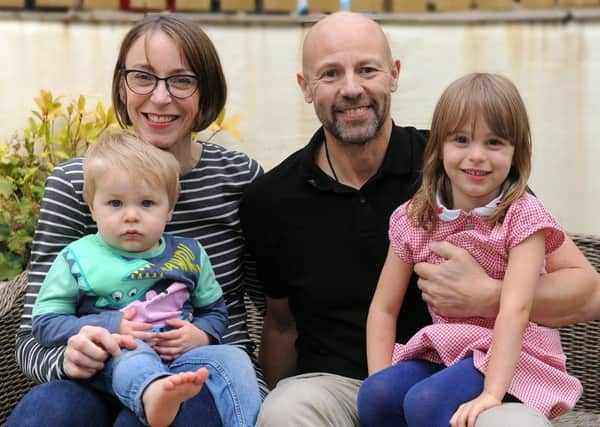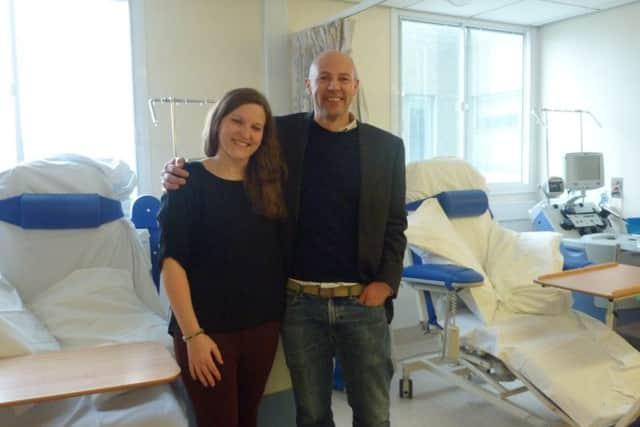A teenage stranger saved my life


Mark Ritson will always have a unique bond with Jacqueline Harfmann, the young woman who saved his life from thousands of miles away and without meeting him. Not only does he owe a priceless debt of gratitude, the pair are now ‘genetic twins’ who share the same DNA.
Harfmann, from Germany, twice donated her stem cells to Ritson to help him overcome a rare blood disease after a worldwide search for a donor.
Advertisement
Hide AdAdvertisement
Hide AdThree years after her selfless act, prompted by her seeing a poster asking ‘Why don’t you save someone’s life?’, she travelled to Yorkshire to meet Ritson and his family, including his young daughter Iona and baby son Magnus, in his home city of Sheffield.


Their meeting last year was the happy ending to almost a decade of extraordinarily-difficult challenges for Ritson.
Now a proud father sharing his story to encourage more people to become blood and stem cell donors, he says his outlook on life has been completely altered by the series of near-death experiences he has been through in the past few years.
“What I have gone through has made me a better, more understanding person. I go walking and fishing in the countryside and can just be overwhelmed with joy at the beauty of the world and the fact I am still here.
Advertisement
Hide AdAdvertisement
Hide Ad“I never ever in a million years would have thought like that before. It sounds bizarre but I am almost glad it happened to me.”


Now aged 50, the business owner says he had “an easy life” blessed with good health up the age of 40 but in 2008, things took a dramatic turn for the worse. He started to develop headaches and began bruising and bleeding easily and things got to the point where he was fainting when standing up.
Ritson was eventually diagnosed with the rare blood disease severe aplastic anaemia, which means the bone marrow does not produce enough platelets or red and white blood cells. The life-threatening condition leaves sufferers vulnerable to uncontrolled bleeding and infections.
“It is only two in a million people who get it, it is extremely rare. I was so ill, I was grateful I had gone into hospital.
Advertisement
Hide AdAdvertisement
Hide Ad“I was in for a couple of weeks and they gave immediately me four units of red blood and two units of platelets. But the only true cure is a bone marrow transplant.”
His sister offered to be a donor but turned out not to be a match. With the search continuing for a donor, Ritson underwent 104 blood and platelet transfusions and had two bouts of aggressive immunotherapy treatment. This appeared to have kept the disease at bay but in 2012 it returned and Ritson was told the only hope of a cure would be a stem cell transplant.
With no suitable donor available in Britain via the Anthony Nolan donor register, a worldwide search of international stem cell registers was undertaken and a match found in Germany with Harfmann, a 19-year-old who had signed up to the register only weeks before. The transplant means that Mark’s immune system and blood group are now identical to Jacqueline’s.
After undergoing high dose chemotherapy to prepare him for the infusion of stem cells, in March 2013, Ritson underwent his first transplant. Just five days after leaving hospital after six weeks in isolation, his wife Lisa gave birth to their daughter Iona. She was born prematurely and weighed just over three pounds, meaning she needed her own stay in hospital.
Advertisement
Hide AdAdvertisement
Hide AdAt the same time, it soon became clear that Ritson’s transplant had failed as his blood count started to drop and he was readmitted to hospital again. “They had to go back to my donor to ask whether she would be willing to try again. I had to wait for two weeks and then we had confirmation she would do it. This was about four to five weeks after Iona was born.
A bone marrow transplant can be a very difficult, aggressive treatment but it often offers the only hope for people with blood cancers or disorders.
The hospital called and said you have a fungal lung infection, that must be resolved very quickly. Within one hour of the call I was back in isolation. The doctors were deciding whether to remove the infected area of lung, but I had no platelets or white cells. It was a very worrying time, as there is a reluctance to even start a transplant when a patient is so ill. In the end they just did the transplant and treated me with very toxic anti-fungals, because ultimately without it I wouldn’t have had any chance to have survived. After another very difficult six weeks in isolation, including more infections, managing badly damaged kidneys from large quantities of chemotherapy and even a two-week attack of hiccups, finally this time it worked.”
But his ordeal was not yet over after the second transplant in September 2013. For 18 months afterwards, due to his weakened state, there was a series of serious complications and infections which even resulted in him breaking ribs as a result of violent coughing fits.
Advertisement
Hide AdAdvertisement
Hide AdOnce his new immune system started working properly, Ritson has been able to start living a normal life once again - going on to have his second child Magnus and even running the London Marathon to raise £6,000 for the Anthony Nolan charity, which works to save the lives of people with blood cancers or disease by finding suitable donors.
Under the rules which cover contact between transplant patients and donors, after a year Ritson was allowed to write a letter of thanks to Jacqueline and after two years they were allowed to exchange personal details and subsequently agreed to meet.
“Without her, I would not have survived. But without the blood transfusions before, I wouldn’t have lived either. They kept me alive to have the treatment and then the transplant saved my life. Certainly without the second transplant, I would have quite possibly not have survived for long.
“She was coming over to London and said she would like to come and meet us in Sheffield. She stayed with us for two days.
Advertisement
Hide AdAdvertisement
Hide Ad“It was overwhelming in a way. She was only 21 or 22 and she had saved my life and enabled me to carry on seeing my little girl grow up and have a little boy. Things had got to the stage before where I had written a letter to give to my little girl in case I didn’t live.
“I thought she must have had someone in her family with a blood cancer or disorder for her to donate. But in Germany many more people are on the donor register.
“She said there had been no special reason, she already donated blood and had just happened to see a poster saying ‘Why don’t you save someone’s life?’ So at the age of 19, she did.
“I can’t imagine a better feeling in your life than to have saved somebody and let them have a full life afterwards - what better gift could you give to somebody?
Advertisement
Hide AdAdvertisement
Hide Ad“The more people there are on the register, the more chance you have of finding a genetic match”
“I never ever thought I wasn’t going to live, even though at points it was probably in the balance. At points, I was very poorly but I’m a pretty determined person with plenty of bloody-mindedness, which is a good Yorkshire trait.”
Speaking last year after she visited Ritson, Harfman said she had not hesitated to try again after the first transplant failed.
“After the first transplant I was so full of hope that everything would be fine,” she said.
Advertisement
Hide AdAdvertisement
Hide Ad“Then they told me it had failed, but there was a possibility to give it another try. They said I could think about it, but I was sure in that very second that I wanted to try. I didn’t want to let him down.
“The whole journey to Sheffield I felt so nervous. Then I finally got to meet him and his wonderful family. Those amazing few days reinforced my feeling; that I did the right thing.”
Demand for more donors
People in Yorkshire are being urged to sign up as blood, organ and stem cell donors.
NHS Blood and Transplant need more than 6,000 blood donations every day to treat patients in need across England, with a particular demand for new donors with the O negative and A negative blood groups, which are ‘universal’ donor groups that are vital for emergency blood and platelet transfusions.
Advertisement
Hide AdAdvertisement
Hide AdAutumn is a time when blood stocks can drop, with shorter days and wetter weather putting people off venturing out to blood donation appointments. An NHS Blood and Transplant spokeswoman, said: “Blood donation save lives and it’s an amazing gift to give.”
For more information, visit www.nhsbt.nhs.uk.